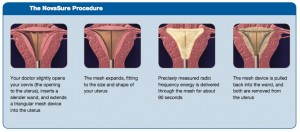Treatment for Heavy Periods Overview
Many women in the Plano, Frisco and Dallas, Texas area suffer from abnormal menstrual periods. For many, a very heavy menstruation is the primary symptom. An average of 90% of women will complain of lengthy or heavy periods at least once in their adolescent years. But when heavy and lengthy periods become a monthly occurrence for a longer period of time than what is deemed normal, a medical treatment for heavy periods might be necessary to cure the problem. For women who experience on-going, very heavy menstrual periods and who are finished having children, one option to consider is endometrial ablation, offered at Women’s Specialists of Plano.
Endometrial ablation is one treatment for heavy periods and is the removal of the uterine lining called the endometrium. Endometrial ablation will not be performed for the removal of cancerous tissue and is not a successful cancer treatment. Endometrial ablation is performed to cure abnormally heavy menstruation, and should only be performed when other non-surgical procedures have failed, and the patient does not desire to become pregnant in the future.
Before the endometrial ablation procedure is performed a biopsy of the endometrium will be performed to ensure that the uterus is free of cancer. Once the biopsy is found to be cancer-free an examination will be performed to ensure that polyps or an infection are not the causes of the heavy bleeding. If all tests come back clear then your doctor may choose to move forward with the endometrial ablation procedure. The best candidates for an endometrial ablation for the treatment of heavy periods usually meet the following criteria:
- A woman who suffers from heavy menstrual bleeding monthly
- A woman who wishes to cease menstruation but wants to avoid hysterectomy
- A woman who is finished bearing children
- A woman whom is clear of genital infection
- A woman who does not have polyps or any other malformation of the uterus
- A woman who has not been diagnosed with cancer
- A woman who has attempted non-surgical therapies to no avail
 To begin the ablation, a woman’s cervix is dilated so that instruments can be inserted through the cavity. The instrument used depends upon the type of ablation you and your doctor have chosen. The different types of ablation can be performed by laser beam, electricity, freezing, heating, or microwave energy. The type of procedure depends upon a number of things including but not limited to:
To begin the ablation, a woman’s cervix is dilated so that instruments can be inserted through the cavity. The instrument used depends upon the type of ablation you and your doctor have chosen. The different types of ablation can be performed by laser beam, electricity, freezing, heating, or microwave energy. The type of procedure depends upon a number of things including but not limited to:
- The preference and experience of the surgeon
- The presence of fibroids
- The size and shape of the uterus
- Whether or not pretreatment medication was given
- The type of anesthesia chosen by the patient and surgeon
The type of procedure most commonly chosen by experienced gynecologists is the FDA approved NovaSure. NovaSure is a minimally invasive and extremely effective endometrial ablation procedure with up to 90% of patients claiming significantly lighter periods after the procedure. NovaSure can usually be performed in office in a few minutes and has been known to cause the patient very little pain. During the NovaSure procedure a woman will come in to the office during her cycle. She will receive a general anesthesia in the cervix prior to the procedure. The cervix will then be dilated and a small wand will be inserted into the cervix. A mesh device will expand from the wand into the uterus fitting the uterine cavity precisely. Then a carefully measured radio frequency is delivered through the mesh for 90 seconds deteriorating the endometrium. The device and the mesh are then removed from the uterus.
The procedure typically lasts about 5-10 minutes and most women are able to return to their daily activities after 24 hours. Some cramping and discharge is associated with the procedure but is normal and should not cause alarm. It is necessary to sustain from sexual intercourse and to avoid tampon usage for several weeks after the procedure or until your doctor has cleared you to do so.
NovaSure is not performed on women who hope to conceive in the future, not because it is not possible, but because it is unsafe for both the mother and the child. Once you return to normal sexual activity after NovaSure it is important that you use some type of contraceptive, you and your doctor should discuss this and decide which contraceptive would be right for you.
Some side effects may follow after the procedure is performed. These symptoms do not occur in every case and should not cause alarm. The truth is that 90% of women who receive this surgery are very pleased with the outcome, and claim to have suffered from very minimal side effects.
If you are suffering from heavy menstrual bleeding, talk to your doctor today and rid yourself of this heavy burden. Treatment for heavy periods by way of endometrial ablation has changed the lives of many women. Talk to your doctor today and get more information on the endometrial ablation procedure that might be best for your situation and learn if NovaSure for heavy periods is your answer.
For additional information on endometrial ablation, a treatment for heavy periods, please contact the Plano, Frisco and Dallas, Texas area office of Women’s Specialists of Plano.

